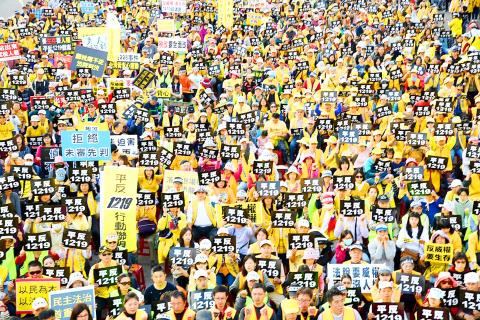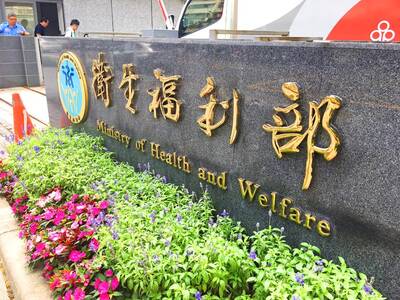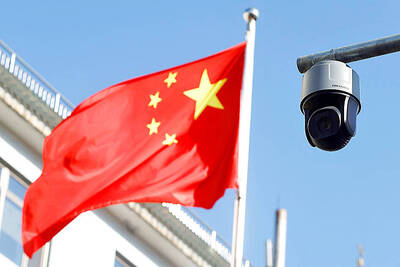Thousands of people wearing yellow vests yesterday rallied in front of the Presidential Office in Taipei to demand that the government reform tax laws and return what they say were unfairly levied taxes.
The tax system is “unfair and lacks transparency,” said the Tax and Legal Reform League, which organized the rally.
To improve the system, the government should convene a national congress to discuss tax reform and establish a committee to help people who have been erroneously taxed, it said in a statement.

Photo courtesy of the Tax and Legal Reform League
The system makes it extremely difficult for victims of erroneous or illegal taxation to recover their money, said Wu Ching-chin (吳景欽), an associate professor in Aletheia University’s Department of Law and one of the league’s founding members.
When someone files an administrative appeal over illegal or erroneous taxation, they still have to pay half of the taxes levied while the case is ongoing, he said.
“This means that if you have been illegally asked to pay NT$10 million [US$324,538], you would have to pay NT$5 million first,” Wu said.
Moreover, the appeal process usually takes 10 years and the chance of winning such a case is only 6 percent, he added.
“Even if you win, the court ruling is useless,” Wu said, adding that the National Taxation Bureau could continue to levy the tax deemed illegal by the court due to a legislative flaw that grants it the authority to “recheck” its own tax decisions.
Tax bureaus continue to levy illegal and erroneous taxes, because admitting mistakes would prevent officials from receiving performance-based bonuses, he said, adding that tax bureaus have more performance-based bonuses than any other government agency.
“To lessen people’s pain, the bureau should stop requiring the same tax to be paid once an administrative court has ruled it to be illegal,” Wu said.
The unfair tax system not only causes unnecessary suffering, but pushes foreign investors away, he said.
The rally is “people’s protest against this undemocratic system and demand for a better life,” he added.
League members began protesting unfair taxes in yellow vests on Dec. 18, 2016, well before the “yellow vest” protests began in France, said another founding member of the league, Chen Chih-lung (陳志龍), a retired National Taiwan University law professor.
“As with the French ‘yellow vest’ protesters, we are against government bullying. We are opposed to the government doing whatever it wants, believing it is the boss,” he said.
“This is a human rights movement,” Chen said, adding that similar protests are happening in Belgium and Hungary.

POLAM KOPITIAM CASE: Of the two people still in hospital, one has undergone a liver transplant and is improving, while the other is being evaluated for a liver transplant A fourth person has died from bongkrek acid poisoning linked to the Polam Kopitiam (寶林茶室) restaurant in Taipei’s Far Eastern Sogo Xinyi A13 Department Store, the Ministry of Health and Welfare said yesterday, as two other people remain seriously ill in hospital. The first death was reported on March 24. The man had been 39 years old and had eaten at the restaurant on March 22. As more cases of suspected food poisoning involving people who had eaten at the restaurant were reported by hospitals on March 26, the ministry and the Taipei Department of Health launched an investigation. The Food and

A fourth person has died in a food poisoning outbreak linked to the Xinyi (信義) branch of Malaysian restaurant chain Polam Kopitiam (寶林茶室) in Taipei, Deputy Minister of Health and Welfare Victor Wang (王必勝) said on Monday. It was the second fatality in three days, after another was announced on Saturday. The 40-year-old woman experienced multiple organ failure in the early hours on Monday, and the family decided not to undergo emergency resuscitation, Wang said. She initially showed signs of improvement after seeking medical treatment for nausea, vomiting and diarrhea, but her condition worsened due to an infection, he said. Two others who

MEDICAL: The bills would also upgrade the status of the Ethical Guidelines Governing the Research of Human Embryos and Embryonic Stem Cell Research to law The Executive Yuan yesterday approved two bills to govern regenerative medicine that aim to boost development of the field. Taiwan would reach an important milestone in regenerative medicine development with passage of the regenerative medicine act and the regenerative medicine preparations ordinance, which would allow studies to proceed and treatments to be developed, Deputy Minister of Health and Welfare Victor Wang (王必勝) told reporters at a news conference after a Cabinet meeting. Regenerative treatments have been used for several conditions, including cancer — by regenerating blood cells — and restoring joint function in soft tissue, Wang said. The draft legislation requires regenerative treatments

Taiwanese should be mindful when visiting China, as Beijing in July is likely to tighten the implementation of policies on national security following the introduction of two regulations, a researcher said on Saturday. China on Friday unveiled the regulations governing the law enforcement and judicial activities of national security agencies. They would help crack down on “illegal” and “criminal” activities that Beijing considers to be endangering national security, according to reports by China’s state media. The definition of what constitutes a national security threat in China is vague, Taiwan Thinktank researcher Wu Se-chih (吳瑟致) said. The two procedural regulations are to provide Chinese